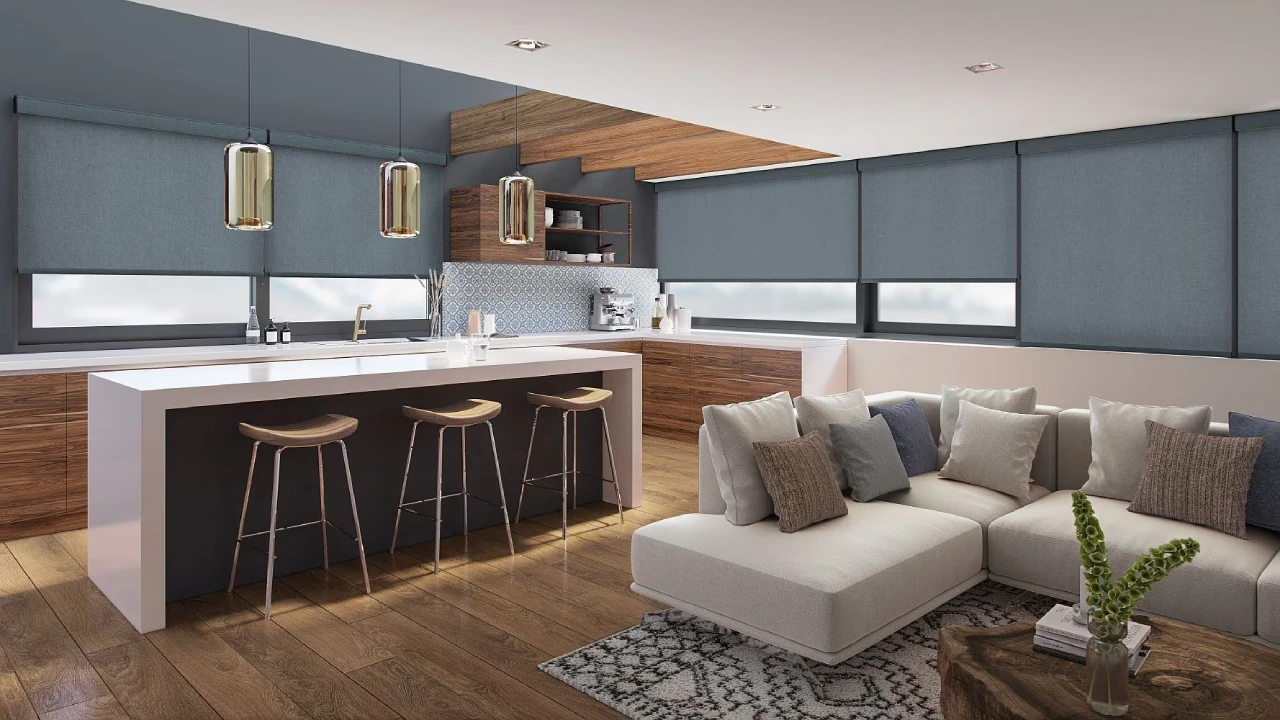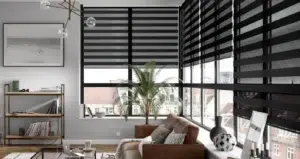Window blinds are a practical and stylish option for covering windows, providing benefits like light control, privacy, and insulation. If you’re thinking about adding blinds to your home, here are some common questions to guide you in making the best choice.
Types of Window Blinds
- Roller Blinds: Simple yet sleek, roller blinds roll up and down on a tube. Available in a variety of fabrics and colors, they can complement different room styles while offering easy light control.
- Venetian Blinds: These blinds consist of horizontal slats, usually made of aluminum or wood, which allow for precise light control and a classic, timeless look.
- Vertical Blinds: Ideal for large windows or sliding doors, these blinds feature vertical slats that can be tilted to control light and privacy.
- Roman Shades: Offering a clean, elegant look, Roman shades fold up into soft pleats when raised.
- Cellular Shades: Also known as honeycomb shades, they have a unique honeycomb structure that provides excellent insulation and light control, helping to keep your home energy-efficient.
Choosing the Right Blinds for Your Home
When selecting the perfect blinds, it’s important to consider a few factors:
- Light Control: If you need to block out light entirely, blackout blinds are the best choice. For partial light control, roller or Venetian blinds are effective options.
- Privacy: For maximum privacy, select blinds with opaque fabrics or combine them with curtains for extra coverage.
- Insulation: If you’re looking for energy efficiency, cellular shades or blackout blinds are great for regulating temperature and reducing energy costs.
- Style: Your blinds should enhance your home’s décor, so choose colors, fabrics, and designs that reflect your taste and complement your space.
- Maintenance: Ease of cleaning is another important factor. Some blinds, like Venetian blinds, are easier to maintain, while fabric blinds may require more care.
Measuring Your Windows
Getting the measurements right is key to ensuring that your blinds fit perfectly. Measure the width and height of the window, including any molding or trim. Each manufacturer may have specific guidelines, so make sure to follow their instructions carefully for the best results.
Customizing Your Blinds
Many companies offer options to customize your blinds to suit your specific needs. You can choose the size, color, fabric, and style that fits your home’s aesthetic. Additional features like cord length, tilt control, and motorization can also be customized to enhance functionality.
Cordless Blinds for Child Safety
If you have young children at home, cordless blinds are a safer option. Traditional blinds with cords pose a strangulation hazard, and cordless designs eliminate that risk, providing peace of mind.
Blinds are a versatile and customizable option for any home, and by considering your specific needs, you can choose the perfect style that enhances both the functionality and look of your living space.
The Difference Between Light Filtering, Blackout, and Room-Darkening Blinds
When choosing window blinds, it’s important to understand the different options available and how they affect light control and privacy.
- Light Filtering Blinds: These blinds are designed to allow a soft amount of light to pass through while still maintaining privacy. They’re a great choice for spaces where you want natural light, such as living rooms or kitchens, but still need a level of seclusion from the outside.
- Blackout Blinds: As the name suggests, blackout blinds are designed to block out almost all light, making the room completely dark. They’re ideal for bedrooms, especially for people who need total darkness to sleep, or for media rooms where light interference needs to be minimized.
- Room-Darkening Blinds: These offer a middle ground between light filtering and blackout blinds. They don’t completely block out light, but they do provide a significant amount of light control, making them a good option for spaces where you want to reduce glare or create a dimmer ambiance without eliminating natural light.
Cleaning and Maintenance
To keep your blinds looking and functioning at their best, regular cleaning is essential. Use a soft brush or duster to remove dust and debris from the slats or fabric. For deeper cleaning, always refer to the manufacturer’s guidelines to avoid damaging the material. Some blinds, especially fabric ones, may need to be cleaned more thoroughly with a vacuum attachment or a damp cloth, while wooden or aluminum blinds might just require occasional dusting.
Installation
While it’s possible to install some types of blinds yourself, like simple roller or Venetian blinds, it’s a good idea to consider professional installation for more complicated window shapes or motorized blinds. Proper installation ensures a secure fit and optimal functionality, especially if you’re dealing with custom-made blinds or larger windows.
Motorized Blinds
For added convenience and a touch of luxury, motorized blinds can be a great choice. These blinds can be controlled remotely using a remote, an app, or even integrated into a smart home system. Motorized blinds are particularly useful for hard-to-reach windows or for homeowners who want to program their blinds to open or close at specific times of day.
Energy Efficiency
Blinds aren’t just about looks—they can also play a big role in your home’s energy efficiency. Insulated blinds, like cellular shades, are particularly effective in helping to control indoor temperatures. In the summer, they reduce heat gain by blocking out sunlight, and in the winter, they prevent heat from escaping, which can lead to noticeable savings on energy bills.
Conclusion
Window blinds offer a wide range of functional and aesthetic benefits for your home. By understanding the differences between light filtering, blackout, and room-darkening options, along with considerations like maintenance, installation, and energy efficiency, you’ll be able to choose blinds that not only complement your space but also meet your practical needs.
FAQs
- What is the best type of blind for a bedroom?
Blackout blinds are typically the best choice for bedrooms as they provide complete darkness, which promotes better sleep.
- Can I install blinds myself?
Yes, many blinds, like simple roller shades, can be installed by DIY enthusiasts. However, for more complex window shapes or motorized blinds, it’s recommended to have them professionally installed to ensure they work properly.
- How often should I clean my blinds?
Dust your blinds regularly to prevent buildup, and give them a thorough cleaning every few months or as needed depending on their material and exposure to dust.





